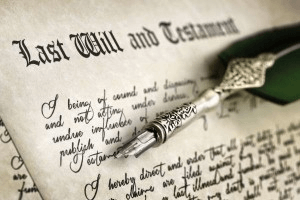Common Estate Planning Myths
Download Our Free Estate Planning Guide
 Most people in Buffalo don’t engage with lawyers unless there’s an unavoidable need. You wouldn’t retain a personal injury lawyer before you suffered an injury, of course, any more than you’d retain a criminal lawyer before being arrested for driving while intoxicated. Other areas of law do invite some degree of forethought: for example, you will generally consult with a divorce or real estate attorney before you take serious steps toward divorce or a real estate transaction. These, though, are legal situations that encourage proactive behavior. Facing divorce or a real estate transaction, you want something specific for your future life: safety, peace of mind, a chance at a new relationship, liquid assets to spend or invest, or a new home for you or your family. You can picture these things; you know they are within your reach; and so, you consult with an attorney, the person who can help bring you closer to what you desire.
Most people in Buffalo don’t engage with lawyers unless there’s an unavoidable need. You wouldn’t retain a personal injury lawyer before you suffered an injury, of course, any more than you’d retain a criminal lawyer before being arrested for driving while intoxicated. Other areas of law do invite some degree of forethought: for example, you will generally consult with a divorce or real estate attorney before you take serious steps toward divorce or a real estate transaction. These, though, are legal situations that encourage proactive behavior. Facing divorce or a real estate transaction, you want something specific for your future life: safety, peace of mind, a chance at a new relationship, liquid assets to spend or invest, or a new home for you or your family. You can picture these things; you know they are within your reach; and so, you consult with an attorney, the person who can help bring you closer to what you desire.
Estate planning is different. The thought of estate planning will for some encourage proactive measures, and for others encourage procrastination. It’s not easy to imagine the concrete things we would desire out of a good estate plan – such as long-term healthcare for ourselves, guardianship for our children, and the preservation of our assets to benefit loved ones – because to think of these plans bearing fruit we must first imagine ourselves declining, and then deceased.
Comprehensive and thoughtful estate planning, though, is essential – no matter the current status of your finances. Failure to engage in comprehensive estate planning could lead to serious concerns late in life – if, for example, your mental powers start to fade or if your body begins to fail you – and could be disastrous if you pass away unexpectedly, leaving all of your assets to be divvied up according to New York State regulations, rather than your wishes.
You can avoid these scenarios – easily – by talking through your finances and priorities with an estate planning attorney. While it might at first not seem like a subject you want to broach, it’s never too early to start planning for the end of your life, and doing so can give you immediate, lasting peace of mind.
Perhaps because so many people avoid thinking about estate planning, there are many persistent myths about this area of the law. Some of these are explained below.
1. I have a will. This means that I have complete control over who inherits my estate and assets.
 Even people who accept that they need more than a will for a comprehensive estate plan can still overestimate the legal power of a will. While people unfamiliar with estate planning often think of a will as a straightforward and unfettered statement of their wishes, this isn’t the case.
Even people who accept that they need more than a will for a comprehensive estate plan can still overestimate the legal power of a will. While people unfamiliar with estate planning often think of a will as a straightforward and unfettered statement of their wishes, this isn’t the case.
You cannot, for example, disinherit your spouse with a will. A spouse will always be entitled to one half of your “wealth” (broader than your estate). This is called a “right of election.” If you attempt to use your will to give your spouse less than one half of your wealth, or if you miscalculate in your will such that it leaves your spouse less than one half of your wealth, your spouse may exercise this right of election and override the terms of your will. You cannot unilaterally refuse this right of election. The only way around it would be through an airtight pre-nuptial or post-nuptial agreement.
As explained above, probate also limits the power of a last will and testament. Two groups of people can potentially challenge a will through probate. One group is the distributes, people who would have taken a portion of your estate had there not been a will. The other group is comprised of anyone the will adversely affects (for example, individuals named in an early will but disinherited in the latest version). To disqualify a will, any challenger must prove incompetence, influence, mistake of fact, or fraud/forgery. In other words, the challenger must demonstrate that you were not mentally capable of writing the will in question; that someone coerced you into writing the will in question; that either you or the witnesses did not know the document you signed was a will; or that the will is fake. None of these claims is easy to prove; on the other hand, you won’t be around to settle the matter with your testimony.
Lastly, a will only affects what happens after you die. Proper estate planning includes end-of-life planning. You should have a power of attorney and a healthcare proxy to make medical and legal decisions in case you become incapable of either. You cannot assign such powers in a will. Also, a will is not the proper place to put your funeral and burial wishes. The probate process will occur after your funeral. Make sure you discuss these arrangements with family and friends, and consider stating your wishes in a separate document. You can talk to a Buffalo estate planning attorney about the best ways to make your funeral and burial wishes a reality.
Summary:
- Probate limits the power of a last will and testament.
- A will does not allow you to disinherit your spouse.
2. It is a good idea to have one person in charge of handling all my affairs.
 When it comes time to assign a power of attorney, healthcare proxy, children’s guardian, executor, and trustee, most people can think of just a handful of names. Many are tempted to assign all these powers and roles to one person.
When it comes time to assign a power of attorney, healthcare proxy, children’s guardian, executor, and trustee, most people can think of just a handful of names. Many are tempted to assign all these powers and roles to one person.
This is not, generally, a good idea. The different roles call for different skill sets, temperaments, levels of commitment, and forms of trust. The executor, for example, has to make decisions in the difficult weeks immediately following your death; that person must be capable of operating under emotional stress and acting quickly and decisively.
The trustee, however, has the longer-term obligation, managing your estate until the beneficiaries come of age. You will want someone comfortable with such a commitment, and qualified with knowledge and experience in financial affairs.
A good trustee might not make a good guardian for your children. Here more than for any other role you need to pick someone who understands and accepts the commitment to care for your children after you’ve passed. This might be a godparent or it might be your own parents – but think twice before you ask. Grandparents do not often want the responsibility of raising another child or group of children so late in life; retired, they will not have financially planned for this and it may be an untenable burden on them; and they may not be at all suited to “trying again” at raising a child in a culture so different from the one they knew when they raised you.
Finally, your power of attorney should be someone you trust completely, and someone with a broad understanding both of your affairs and of legal affairs generally. In contrast your healthcare proxy should understand your stated wishes as well as your philosophical and religious convictions.
Summary:
- The roles of power of attorney, healthcare proxy, children’s guardian, executor and trustee call for different skill sets.
Download Our Free Estate Planning Guide
3. You need to be very rich to make setting up a trust worthwhile.
 When people think of “trusts,” they often think of the very wealthy – of annual investment incomes and “trust fund babies” and all the trappings associated with the leisure class. They might even think a lawyer would decline to set up a trust for assets below a certain threshold.
When people think of “trusts,” they often think of the very wealthy – of annual investment incomes and “trust fund babies” and all the trappings associated with the leisure class. They might even think a lawyer would decline to set up a trust for assets below a certain threshold.
This is all misleading and misled. Almost anyone can set up a trust. If your debts are larger than your assets when you die, then creditors will make claims to your estate – but even in this case you may be able to use a trust to pass assets on to your loved ones before creditors come to seize them.
Even if you only have a few thousand dollars to pass on, a trust could be worthwhile. If your beneficiaries are young, and if you appoint a capable trustee, those funds could grow significantly after your death and make a much bigger impact than you might realize when your trustee finally distributes them.
Talk to your Buffalo estate planning attorney estate planning attorney about your finances to understand if a trust might help in your situation.
Summary:
- If an individual’s debts are greater than their assets, creditors will make claims to the estate upon the individual’s death.
- A trust will help to pass assets on to your loved ones and not let creditors seize them.
4. If I die with debts that exceed the value of my estate, my family will be liable.
 No individual can be legally liable for debts solely in another individual’s name. Your estate will be liable for your debts, but this liability does not extend to your family members, to the beneficiaries named in your will, or to your executor or trustee.
No individual can be legally liable for debts solely in another individual’s name. Your estate will be liable for your debts, but this liability does not extend to your family members, to the beneficiaries named in your will, or to your executor or trustee.
This doesn’t mean that the creditors won’t call making inquiries. Many do contact the family members of deceased debtors; this is patently fraudulent but not necessarily illegal. Know that if you’ve survived a loved one who left debts, you do not have to talk to any creditors, and it probably will not benefit you to do so. If you continue to receive calls or if you receive any communication you feel is harassment, contact your Buffalo estate planning attorney.
If you have debts, or shortly will have debts, and are beginning your estate planning process, you’ll be worrying about leaving nothing behind for your loved ones. If you take action early enough, you could pass on your most significant assets and keep them safely beyond the legal claims of your creditors. You might use deed transfers or revocable or irrevocable trusts.
Summary:
- No individual can be legally liable for debts solely in another individual’s name.
- However, that does not stop creditors from contacting family members of the deceased to make inquiries.
If you or a loved one want to begin thinking about estate planning, give Buffalo estate planning attorney, Randy Gugino a call for guidance.






